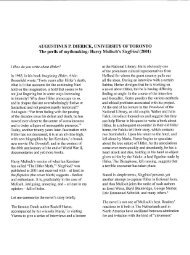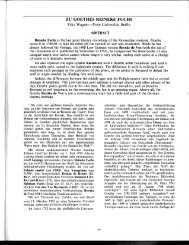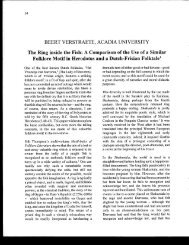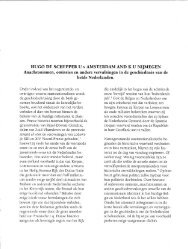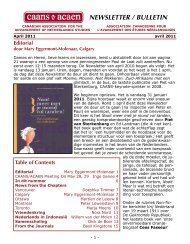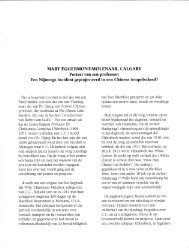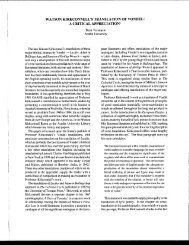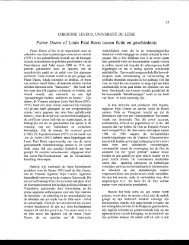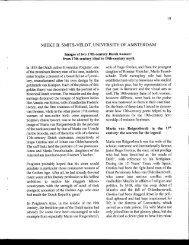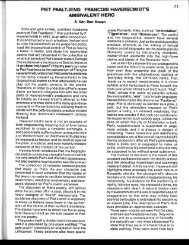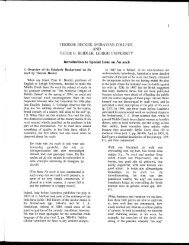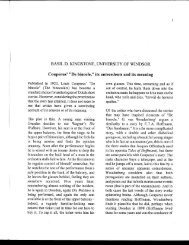Fred J. Nichols - Maria Tesselschade Roemer Visscher (1593-1649)
Fred J. Nichols - Maria Tesselschade Roemer Visscher (1593-1649)
Fred J. Nichols - Maria Tesselschade Roemer Visscher (1593-1649)
You also want an ePaper? Increase the reach of your titles
YUMPU automatically turns print PDFs into web optimized ePapers that Google loves.
MARIA TESSELSCHADE ROEMER VISSCHER (<strong>1593</strong>-<strong>1649</strong>)<br />
<strong>Fred</strong> J. <strong>Nichols</strong><br />
City University of New York<br />
New York, USA<br />
<strong>Maria</strong> <strong>Tesselschade</strong> <strong>Roemer</strong> <strong>Visscher</strong>, daughter of the poet and humanist <strong>Roemer</strong> <strong>Visscher</strong>, was born in<br />
Amsterdam in <strong>1593</strong>. She was a central figure on the literary scene of her time, maintaining friendships<br />
with all the leading poets of the Muiderkring; most of her own poetry has unfortunately been lost. We<br />
know her mainly through the poetry of others, as well as through the correspondence she maintained with<br />
her friends and acquaintances. /<br />
<strong>Maria</strong> <strong>Tesselschade</strong> <strong>Roemer</strong> <strong>Visscher</strong> is<br />
both an elusive and a central presence in<br />
Dutch seventeenth-century literature. She is<br />
elusive because much of her work has been<br />
lost: less than thirty poems and about the<br />
same number of letters survive. She exists<br />
for us mainly in the texts of the male<br />
writers of the period, the major figures in<br />
Dutch literature, who found her so<br />
fascinating.l She was the central attraction<br />
of the Muiderkring, that literary and musical<br />
circle which the poet and historian P.e.<br />
Hooft assembled each summer at the<br />
Muiderslot. This was the castle, still<br />
preserved as a museum, where he lived in<br />
his capacity as "drost," the chief<br />
administrative officer of a rural district<br />
under the jurisdiction of the city of<br />
Amsterdam. Those associated with this<br />
circle included Vondel, Constantijn<br />
Huygens, Barlaeus and many other<br />
prominent luminaries of the time. It is in<br />
their correspondence and in the poetry that<br />
they wrote to and about her, that<br />
<strong>Tesselschade</strong> (as she has always been called<br />
then and since) still lives for us. In these<br />
texts we get a sense of a gifted, intelligent<br />
and strong-minded woman.<br />
She was born in Amsterdam in <strong>1593</strong>, one<br />
of three daughters of the poet and humanist<br />
<strong>Roemer</strong> <strong>Visscher</strong>, who gave his daughters<br />
an education remarkable for women at that<br />
time. <strong>Tesselschade</strong> and her almost equally<br />
gifted sister Anna, ten years older, learned<br />
French and Italian fluently. <strong>Tesselschade</strong><br />
seems to have been especially at home in<br />
the latter language; two of her surviving<br />
poems are written in it. The sisters were<br />
taught calligraphy, drawing, painting, and<br />
engraving on glass. Engraving became a<br />
kind of specialty of theirs, of which at least<br />
. /<br />
one spectmen has been preserved. One of<br />
their other accomplishments was that they<br />
learned to swim, remarkable for anyone at<br />
that time; in Huygens' account of his own<br />
childhood he makes a point of the fact that<br />
he had not been able to master this skill.<br />
But what made <strong>Tesselschade</strong> most<br />
appreciated in the Muiderkring was her<br />
musical talent. She was able to play several<br />
musical instruments and had by all<br />
accounts an especially fine singing voice.<br />
Her singing was perhaps the first attraction<br />
of a visit to the castle at Muiden.<br />
The name by which she has always been<br />
known (which, to judge by her correspondence,<br />
she preferred to the plainer<br />
<strong>Maria</strong>) is the result of a curious whim of<br />
her father's. <strong>Roemer</strong> <strong>Visscher</strong> was by<br />
profession an Amsterdam merchant, a grain<br />
dealer. He had invested in a convoy<br />
carrying grain to the Mediterranean which<br />
was wrecked by a storm off the island of<br />
Texel on Christmas Eve, <strong>1593</strong>. His loss<br />
must have been still fresh in his mind when<br />
his third daughter was born the following<br />
March. Although she was baptized with<br />
the familiar diminutive Marritgen, he called<br />
her <strong>Tesselschade</strong>, literally, "Texel-harm."<br />
Did he regard her birth as a compensation<br />
for that loss?<br />
There remains one portrait of her, done at<br />
the age of eighteen by Goltzius. It shows a<br />
young woman with a remarkably beautiful<br />
face, calm, composed, introspective, and as<br />
intelligent as she is beautiful; both her<br />
beauty and intelligence impressed those<br />
who met her throughout her life. Her<br />
father's house, on what is now the<br />
Geldersekade in Amsterdam, was itself a<br />
lively center for those with literary and
20 <strong>Fred</strong> <strong>Nichols</strong><br />
artistic inclinations, where Hooft and<br />
Vondel were regular visitors. The two<br />
gifted sisters were not yet married when<br />
their father died in 1620. By this time<br />
<strong>Tesselschade</strong> was being courted by the poet<br />
Bredero, and had already made the<br />
acquaintance of the writer with whom she<br />
had her most complex friendship,<br />
Constantijn Huygens. With her sister Anna,<br />
she seems to have made her first visit to the<br />
Muiderslot in the summer of 1621, where<br />
she quickly became the central ornament.<br />
Though she fascinated the leading literary<br />
figures of her time, she disconcerted all her<br />
admirers by marrying a naval officer, Allard<br />
(Adelaert) Crombalgh, in 1623, and moving<br />
with him to Alkmaar where he lived. To<br />
the puzzlement of observers then and since,<br />
the only remarkable thing about him seems<br />
to have been that he was very handsome.<br />
Her marriage did not, however, end her<br />
involvement with Hoofl's circle. Hooft,<br />
Huygens and Vondel all wrote poems on<br />
her wedding. She kept in touch with her<br />
eminent friends by letter, and she and her<br />
husband were regular visitors at Hooft's<br />
castle, where she continued to be a center of<br />
attention. Every bit of evidence suggests<br />
that the marriage was a happy one, but it<br />
ended abruptly eleven years later when her<br />
husband unexpectedly died just after the<br />
death of their second child. One child had<br />
already died at birth and <strong>Tesselschade</strong> was<br />
left alone with her third daughter, also<br />
named <strong>Maria</strong>. We have the letter she wrote<br />
Hooft about her loss:<br />
You will be able to understand sickness's<br />
nature, death's swiftness, and other<br />
circumstances which I have borne with a<br />
weeping soul, an oppressed heart and a<br />
grieving spirit, but with dry eyes, no other<br />
thought occupying my mind in so sad and<br />
grievous a night, robbed of my soul's sun,<br />
than recalling my beloved, and oh! all too<br />
affectionate Adelaert, who as if on the wings<br />
of love rose to heaven after his Tadea, having<br />
chosen an immortal over a mortal lot, leaving<br />
me behind (alas!) in my depression with the<br />
company of his beloved other half, that in<br />
her, as in a mirror, I may always have his<br />
form with me in my mind's eye, trusting in<br />
that higher will against which there is no<br />
willing?<br />
As a highly eligible widow, she<br />
maintained her attraction for these highly<br />
attentive literary men. Huygens describes<br />
her in a Latin letter to his friend Puteanus,<br />
a professor of rhetoric at Louvain, who had<br />
just met Anna. /He thinks his friend would<br />
have been farimore impressed<br />
/<br />
if you had met her sister <strong>Tesselschade</strong>, a<br />
widow also most able with her hand, but far<br />
more delightful in her beauty, speech and<br />
character, yet with truly distinguished<br />
intellectual abilities .... I think very highly<br />
of her, nor would you be able not to do the<br />
same, if you had only seen one little poem of<br />
those which she engenders every day ....<br />
(Worp 268).<br />
In 1637, a few years after the loss of her<br />
husband and child, she had occasion to<br />
console Huygens on the death of his own<br />
beloved wife, Suzanna van Baerle, the focus<br />
of some of his most intensely felt poems.<br />
This <strong>Tesselschade</strong> did in one of her most<br />
effective poems, a sonnet in which she<br />
urges him to express his grief in the form of<br />
poetry:<br />
Zeght Vastaert, dat hij moght<br />
[pampieren raet vertrouwen<br />
Zoo dinnerlycke smart<br />
[zich schriftlyck uyten kon<br />
Hij staroogh in liefs glans<br />
[als Aedlaer in de Son,<br />
En stel syn leed te boeck,<br />
[zoo heeft hij 't niet t'onthouwen.<br />
Pam pier was 't waepentuijch,<br />
[waermee ick heb geweert<br />
Te willen sterven, eert<br />
[den Heemel had begeert<br />
Daer overwon ick mee<br />
[en deed mijn Vyand wijcken.<br />
(Tell Vastaert that he must entrust himself to<br />
paper's wisdom / This way he could utter<br />
his inner pain in writing. / Let him look into<br />
love's brilliance like an eagle at the sun, /<br />
And record his pain, then he doesn't have to<br />
keep it with him. / Paper was the weapon<br />
which I used to avert / My wish to die<br />
before heaven intended; / With it I
conquered myself and drove my foe to<br />
flight).3<br />
Just before this time, the Muiderkring had<br />
acquired a distinguished new member,<br />
Caspar van Baerle, better known under the<br />
Latin form of his name, Barlaeus. A former<br />
professor of logic at Leiden and a trained<br />
physician, he was rounding out a<br />
distinguished and animated career as a<br />
professor of philosophy at the Academy in<br />
Amsterdam, and he was a recent widower.<br />
He also enjoyed a considerable reputation<br />
in his time as a writer of Latin verse. He<br />
immediately fell under <strong>Tesselschade</strong>'s spell<br />
-his own play on words, since the Latin<br />
form of her name, Tessela, can also refer to<br />
Thessaly, a region notorious in antiquity for<br />
its witches--and proposed to her in 1636.<br />
That she turned him down, attached as she<br />
remained to her dead husband's memory,<br />
did nothing to dampen his ardor.<br />
<strong>Tesselschade</strong>'s accomplishments did not<br />
include a knowledge of Latin, and this put<br />
him at somewhat of a disadvantage. As he<br />
himself observed in a letter to Huygens<br />
(qtd. in Worp 148), he felt far more<br />
comfortable writing poetry in Latin than in<br />
Dutch, which meant that his poetic<br />
compliments to <strong>Tesselschade</strong> had to be<br />
translated for her. On the other hand, he<br />
and Huygens took advantage of her not<br />
knowing the language to occaSionally<br />
exchange Latin poems of a decidedly gamy<br />
character about her. Hooft and Huygens<br />
encouraged Barlaeus in his hopeless<br />
campaign; it seems to have amused them.<br />
But the independent-minded woman again<br />
confounded her admirers by a decisive step.<br />
Sometime around the beginning of 1642, she<br />
converted to Roman Catholicism. This was<br />
not a sudden move. Her sister Anna, now<br />
also a widow, had converted to Catholicism,<br />
and there is evidence that <strong>Tesselschade</strong> had<br />
felt a growing sympathy for that religion, to<br />
which the poet Vondel had also converted<br />
in 1641. This conversion had the effect of<br />
placing her out of reach as an object of<br />
matrimony of the Protestant widowers<br />
Barlaeus and Huygens. Interestingly<br />
<strong>Maria</strong> <strong>Tesselschade</strong> <strong>Roemer</strong> <strong>Visscher</strong> (<strong>1593</strong>-<strong>1649</strong>) 21<br />
enough it was Huygens, a generally tolerant<br />
man toward Catholics although himself a<br />
convinced Calvinist, who reacted the more<br />
strongly.<br />
Huygens' attitude toward <strong>Tesselschade</strong><br />
remains something of an enigma. He<br />
enjoyed the company of attractive women,<br />
and particularly of/gifted attractive women.<br />
At times he took/ upon himself the role of<br />
Barlaeus' rivaY as her suitor, although<br />
always in a joking vein. Yet his reaction to<br />
her conversion was sharp, even harsh. He<br />
himself said of it, "I don't spare the rod, I<br />
love the child too much" (Worp 261). His<br />
intense campaign to make <strong>Tesselschade</strong> see<br />
the error of her ways and return to what for<br />
him was the true faith, finally stirred this<br />
even-tempered woman to an unusually<br />
pointed retort. In one of the many poems<br />
by her that have been lost, she seems to<br />
have accused Huygens, who was the<br />
secretary to the Stadhouder, the de facto<br />
ruler of the Dutch Republic, of owing his<br />
religious convictions to political expediency<br />
rather than to genuine belief. This stung<br />
Huygens in turn to write one of his most<br />
trenchant sonnets:<br />
Mijn Tong en was noijt veil,<br />
[mijn' Penne noijt verkocht,<br />
Mijn' Handen noijt in strick<br />
[van Goud of Diamanten,<br />
Mijn' Vrijheid noijt verslaeft,<br />
[om met fluweele wanten<br />
De waerheid aen te gaen,<br />
[en anders dan ick docht.<br />
(My tongue was never venal, my pen was<br />
never sold, / My hands never ensnared by<br />
gold or diamonds, / My freedom never<br />
bound,so that with velvet gloves / It went<br />
against the truth, diverging from what I<br />
thought)(Worp 297).<br />
Huygens concludes this burst of indignation<br />
with one of his characteristic plays on<br />
words, addressing his errant friend as<br />
"Beroemde, maar, eilaas, beRoomde<br />
Tesselscha" (Renowned but alas, Romanized<br />
<strong>Tesselschade</strong>).<br />
Yet even this exchange did not shake the



